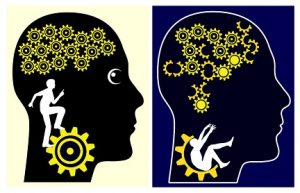
It’s common knowledge that we need to learn to succeed, however traditionally we’ve been told that to learn and remember what you’ve learnt you need self discipline to engage in hours and hours of repetitive work, with no distraction, usually in quiet isolation. This process often causes anxiety and stress, as does the feeling of impending failure due to the inability to remember information. To remember information, it is true that the brain requires repetition, however cramming the brain with information to pass an exam is stressful, and stress is a trigger for forgetfulness. Information cramming also means that at least 80% will be forgotten within a week according to Hermann Ebbinghaus who created the ‘Forgetting Curve’. The Forgetting Curve says that we forget 50% of what we learn in the first hour of learning it, and 70% by the next day, unless we put it into practice, or make no attempt to retain it. There are a number of factors that impact the speed of forgetting:
- How difficult the information is to understand
- How the information is represented
- The condition of the learner e.g. stressed or relaxed
- Whether the learner is well rested and getting enough sleep
 Back in 1885 Hermann identified that to improve your memory you should revisit what you have learnt on a regular basis, but not by just reading information from notes taken in class, or in a book, but by applying the knowledge, perhaps by answering a question, performing a task in the workplace, doing some sort of activity such as a quiz or teaching someone else.
Back in 1885 Hermann identified that to improve your memory you should revisit what you have learnt on a regular basis, but not by just reading information from notes taken in class, or in a book, but by applying the knowledge, perhaps by answering a question, performing a task in the workplace, doing some sort of activity such as a quiz or teaching someone else.
Young people today often revise with the radio or their music, whilst dipping into social media, but research has found that multitasking can make learning less effective. However, interspersing learning with periods of using social media or watching the television can improve learning. According to Benedict Carey, author of ‘How we Learn: The Surprising Truth about When, Where, and Why It Happens’, cognitive research found that strategies such as short periods of learning, interspersed with other activities such as a walk, listening to music, a chat with friends or a trip to a café can have a positive impact on learning. Also that memory exercises, puzzles and games aid deeper learning, and done on a regular basis can slow the shrinking of our brain, a natural process as we age.
Understanding in simple terms how our brain learns best can help us, not just in an education setting, but also in work to ensure that the learning we undertake gives us the best opportunity to develop our knowledge and understanding for now and in the future. Gray matter, which processes information in the brain, is composed of neurons which transmit information around the brain. The connections between neurons become more numerous and stronger the more signals they send; signals are generated by such things as learning a new piece of information, experiencing something new, recalling a fact or event. A brain that is continually shaping and growing is more likely to enable us to remember what we’ve learnt. The Hippocampus is the part of the brain that is responsible for memory and can be damaged by too much cortisol, a hormone that is released when we are under a lot of stress, hence the reason why if we’re stressed we’re less likely to remember what we’ve learnt.
When neurons in the brain become tired they become less effective; after only 3 to 5 minutes of sustained activity neurons need a rest to work at their best, but they recover in only a few minutes when rested. Studies by Hermann Ebbinghaus and later Ver Birkenbihl, a German management trainer, found that three 10 minute sessions of learning are much more effective than a 1 hour session. Learning in this way helps to store information in your long term memory. So short spells of learning are more likely to have better results than prolonged sessions and for information to be remembered we should intersperse it with knowledge checks, preferably in the form of a quiz or game to maximise our engagement. In addition we should revisit or recall information that we have learnt at least 3 times, and for maximum long term memory revisit the learning regularly on an on-going basis.
 So if you are employer who traditionally sends employees on classroom training it would be advantageous to follow this up with online learning that enables the employee to revisit the crucial information you require them to remember on a regular basis. Use online courses that are interspersed with engaging activities to check understanding and to apply what has been learnt. In many instances classroom training can effectively be replaced with online learning, especially when the training requires the learner to understand information to develop their knowledge, and to demonstrate that they can then apply it theoretically. Some online learning offers simulative environments to check understanding in a real work situation, or interactive games, but for best results the knowledge learnt is practised and demonstrated in the workplace with peer support.
So if you are employer who traditionally sends employees on classroom training it would be advantageous to follow this up with online learning that enables the employee to revisit the crucial information you require them to remember on a regular basis. Use online courses that are interspersed with engaging activities to check understanding and to apply what has been learnt. In many instances classroom training can effectively be replaced with online learning, especially when the training requires the learner to understand information to develop their knowledge, and to demonstrate that they can then apply it theoretically. Some online learning offers simulative environments to check understanding in a real work situation, or interactive games, but for best results the knowledge learnt is practised and demonstrated in the workplace with peer support.
Bite sized learning is not new in online learning, however the definition of bite sized has changed and now tends to mean between 5 and 15 minutes, following the theory that short bursts of learning have better outcomes for the learner. But many would argue that compared with a day in the classroom a one hour online course is bite sized. Our experience at eLearning Marketplace is that employers often choose 15 minute bite sized training for quick professional development covering subjects such as soft skills, when a final assessment is not required. For deeper learning they choose 30 to 90 minute training often for compliance and professional development when a required level of knowledge is tested and evidenced with a certificate.
When considering what type of training is most suited to the individual and to meet the organisation’s objectives, give some thought as to how the brain works so that your employees and the organisation can have long term benefit from the training you provide.
Article written by Carolyn Lewis, Managing Director, eLearning Marketplace Ltd
eLearning Marketplace has a catalogue of over 2,000 online courses covering compliance, professional development and vocational qualifications. We offer a price match guarantee on advertised prices, a FREE learning management system to track, evidence and manage training and a FREE Licence Manager app to manage course licences.
Not all courses are on the website so if you can’t find what you are looking for please do get in touch: 0844 854 9218
Sources:
http://www.flashcardlearner.com/articles/the-forgetting-curve/
https://www.brainscape.com/blog/2012/03/facts-about-your-gray-matter/
https://www.verywellmind.com/how-to-become-a-more-effective-learner-2795162
http://www.human-memory.net/brain_neurons.html







 UK: 0844 854 9218 | International: +44 (0)1488 580017
UK: 0844 854 9218 | International: +44 (0)1488 580017








